

INVESTIGATIVE AGENCIES. December 2006 Nine Federal agencies are designated to investigate disability-related discrimination complaints filed against State and local government programs under Title I or Title II of the Americans with Disabilities Act (ADA).
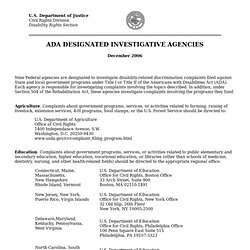
Each agency is responsible for investigating complaints involving the topics described. Publications. Accessible Tech - For Accessible Technology In The Workplace. Welcome to "Hospitality & Disability" Basic Search. ADA National Network: Your Resource on the Anniversary of the Americans with Disabilities Act (ADA) ~ Questions? 1-800-949-4232 [voice/tty] Disability Law Lowdown Website.
ADA Case Law Database. 2011 Disability Law: Cases, Materials, Problems_pdf. Journal of DuPage County Bar Association. Midwest Center on Law and the Deaf. EEOC: Disability Discrimination. Disability discrimination occurs when an employer or other entity covered by the Americans with Disabilities Act, as amended, or the Rehabilitation Act, as amended, treats a qualified individual with a disability who is an employee or applicant unfavorably because she has a disability.
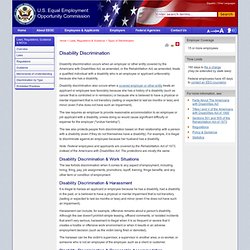
Disability discrimination also occurs when a covered employer or other entity treats an applicant or employee less favorably because she has a history of a disability (such as cancer that is controlled or in remission) or because she is believed to have a physical or mental impairment that is not transitory (lasting or expected to last six months or less) and minor (even if she does not have such an impairment). The law requires an employer to provide reasonable accommodation to an employee or job applicant with a disability, unless doing so would cause significant difficulty or expense for the employer ("undue hardship").
William Goren Blog. The bloggosphere reports that the City of Lomita California has asked the full Ninth Circuit to rehear the ruling in this case.
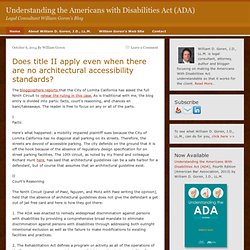
As is traditional with me, the blog entry is divided into parts: facts, court’s reasoning, and chances en banc/takeaways. The reader is free to focus on any or all of the parts. I Facts: Here’s what happened: a mobility impaired plaintiff sues because the City of Lomita California has no diagonal stall parking on its streets. Therefore, the streets are devoid of accessible parking. II Court’s Reasoning The Ninth Circuit (panel of Paez, Nguyen, and Motz with Paez writing the opinion), held that the absence of architectural guidelines does not give the defendant a get out of jail free card and here is how they got there: 1. 2. 3. 4. 5. 6. 7.
Legal Mandates Section - Document.
Americans with Disabilities Act. Rehabilitation Act. Lawsuits. Apps for Justice - Learning Law by Creating Software. DREDF: Disability Rights Education and Defense Fund. Looking Back on a Decade of Progress. The ADA protects the right of people with disabilities to have equal access to the basic institutions of State and local government.
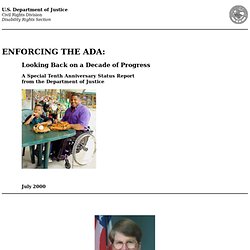
The Department has sought to eliminate physical, communication, and policy barriers in law enforcement, town halls, jails, courtrooms, and legislative chambers. 1. Affirming the Right to Citizen ParticipationWisconsin City Makes City Hall Accessible -- In resolving a complaint by a Waukesha City alderman who uses a wheelchair, the City agreed to make its city hall accessible. It agreed to hold its closed deliberations in the accessible room in which it holds general meetings, renovate the first floor bathrooms, install automatic door openers at the building's entrance, and provide a van accessible parking space.Small Montana Town Provides Access to Civic Functions -- Manhattan, Montana, agreed to make its town programs accessible by making a few renovations and taking alternative nonstructural measures. Internet Legal Research Group.
Office for Civil Rights. Section 504, the ADA and Education Reform. Print this page Introduction In implementing education reform initiatives, public schools and school systems must abide by Section 504 of the Rehabilitation Act of 1973 (Section 504) and Title II of the Americans with Disabilities Act (ADA) which prohibit discrimination on the basis of disability.
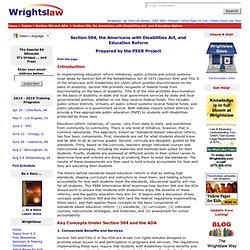
Section 504 prohibits recipients of federal funds from discriminating on the basis of disability. Title II of the ADA prohibits discrimination on the basis of disability in state and local government services by state and local governmental entities, whether or not they receive federal funds. This includes public school districts. Education reform initiatives, of course, vary from state to state, and sometimes from community to community. The theory behind standards-based education reform is that by setting high standards, shaping curriculum and instruction to meet them, and holding schools accountable for how well students meet the standards, educational quality will rise for all students. 1.
Overview of ADA, IDEA, and Section 504. Americans With Disabilities Act of 1990 (ADA) Type/Purpose--A civil rights law to prohibit discrimination solely on the basis of disability in employment, public services, and accommodations.
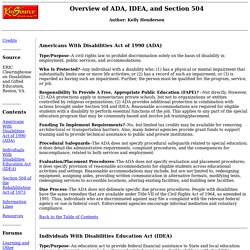
Who Is Protected? --Any individual with a disability who: (1) has a physical or mental impairment that substantially limits one or more life activities; or (2) has a record of such an impairment; or (3) is regarded as having such an impairment. Further, the person must be qualified for the program, service, or job. Responsibility To Provide A Free, Appropriate Public Education (FAPE)? Funding To Implement Requirements? Procedural Safeguards--The ADA does not specify procedural safeguards related to special education; it does detail the administrative requirements, complaint procedures, and the consequences for noncompliance, related to both services and employment.
Due Process--The ADA does not delineate specific due process procedures.